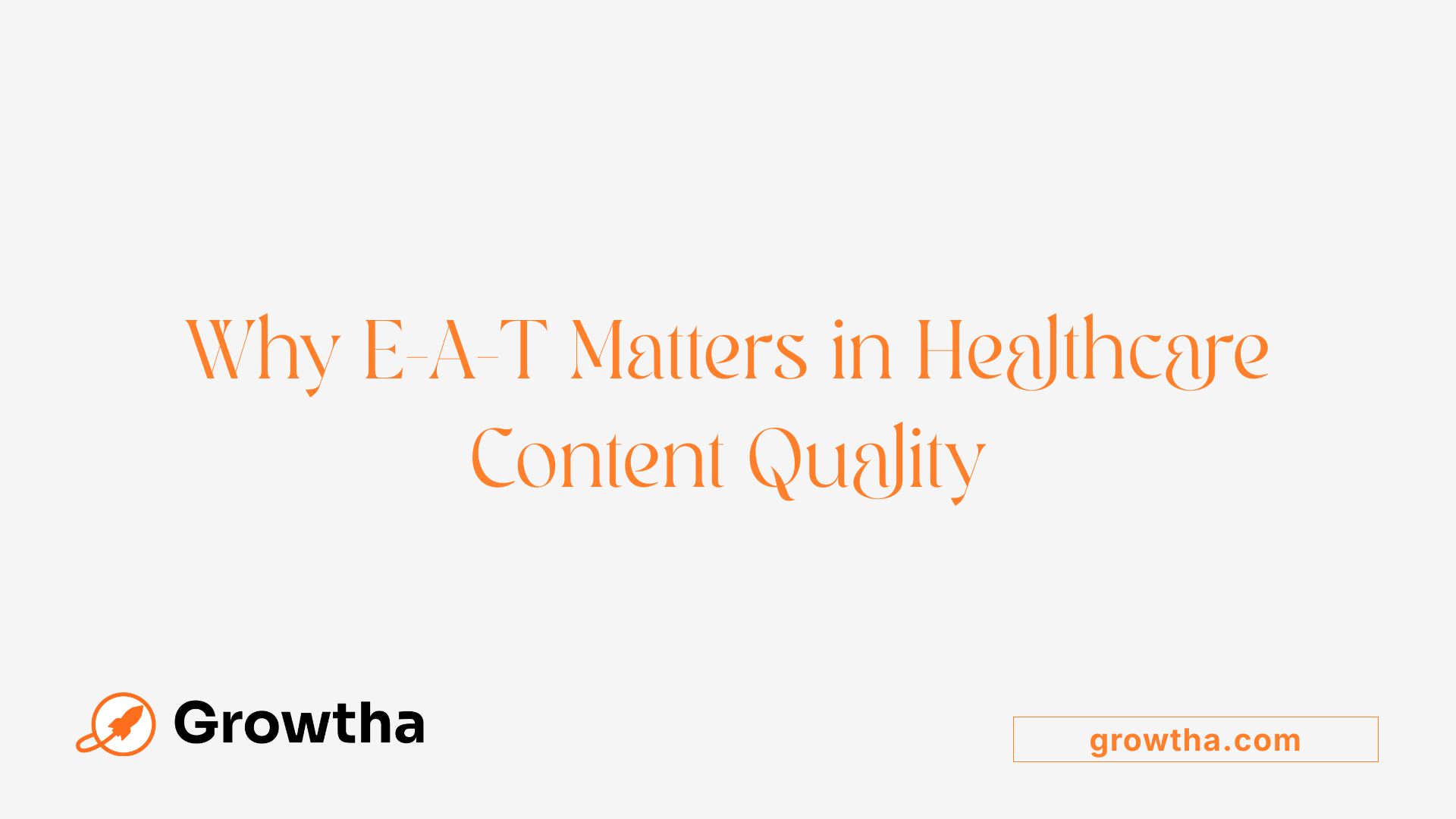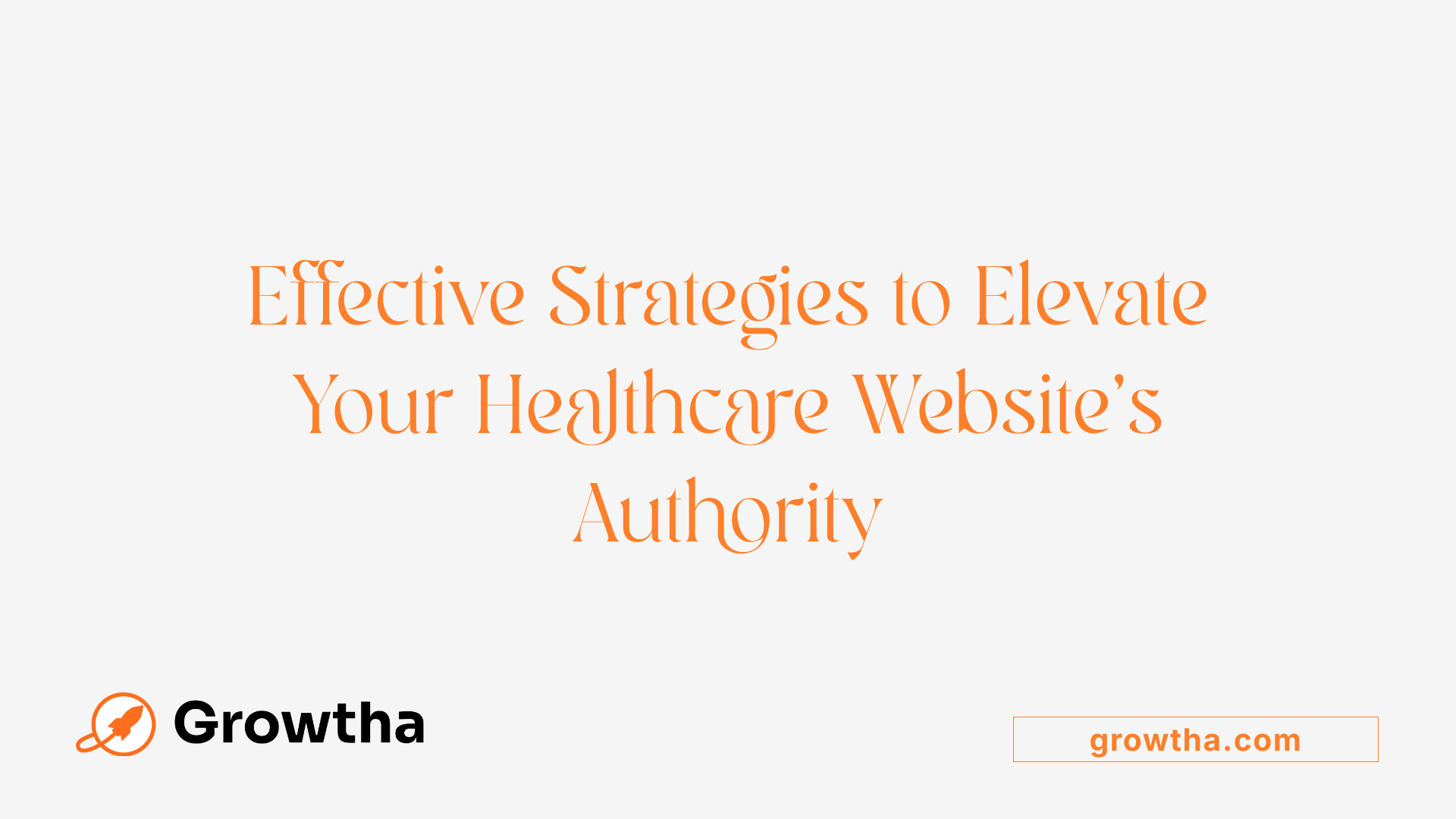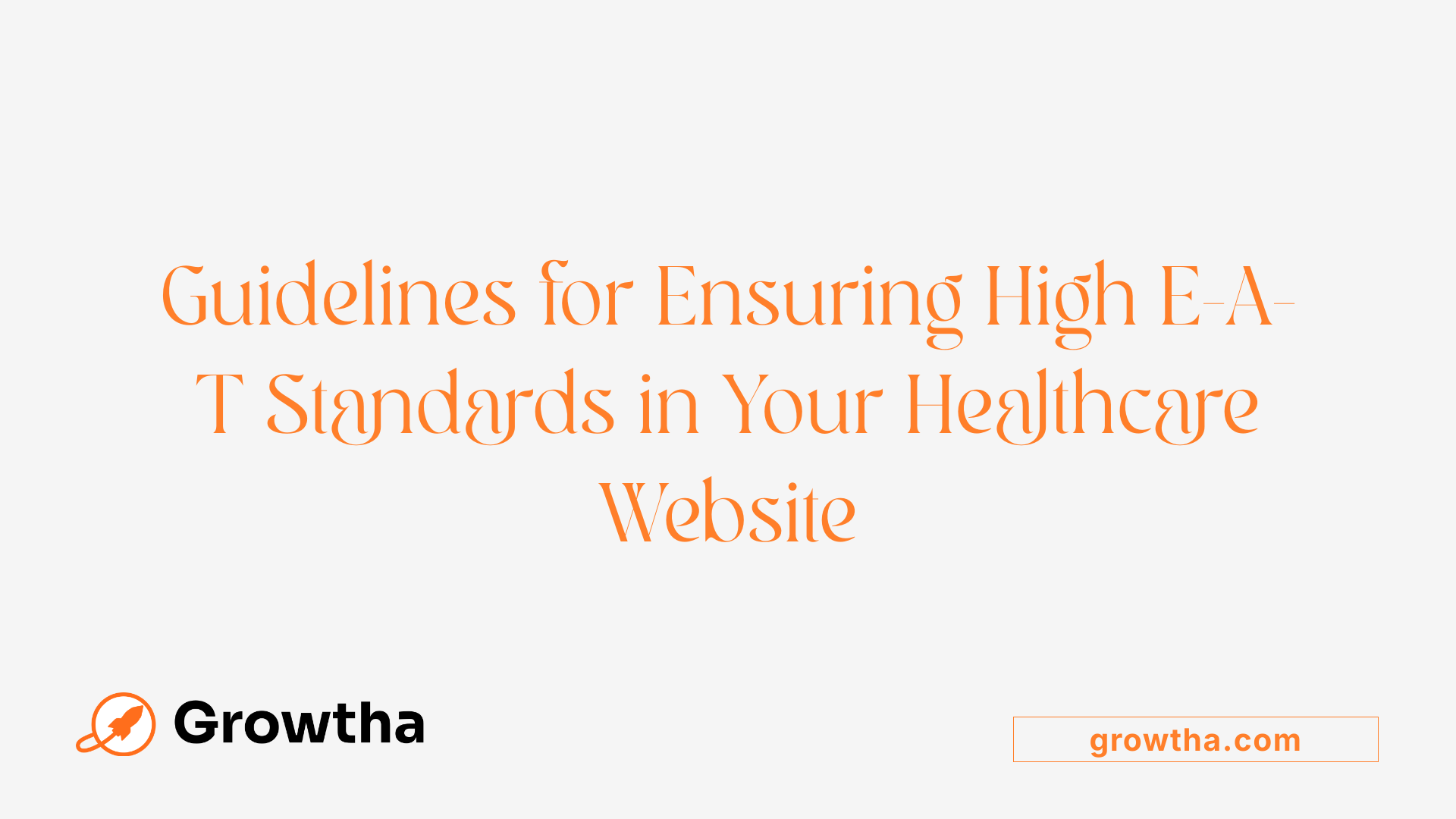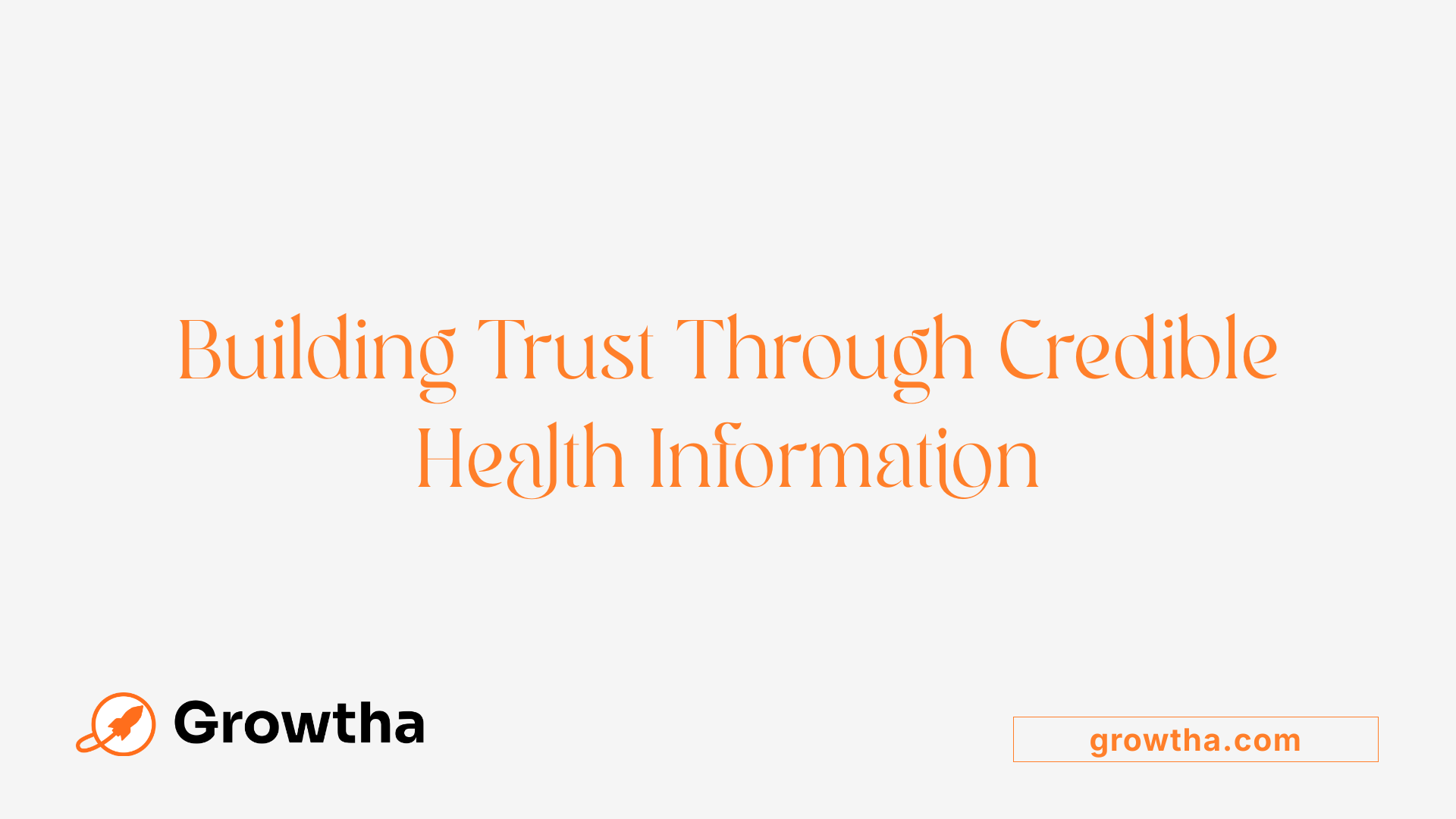Understanding E-A-T for Healthcare Websites
The Foundations of Credibility: Building Trust in Healthcare Websites


Understanding E-A-T for Healthcare Websites
Establishing Trust and Authority in Digital Health Content
In today's digital age, healthcare websites serve as vital sources of information for millions seeking health guidance online. Ensuring that this information is credible, accurate, and trustworthy is crucial for patient safety and effective decision-making. A comprehensive understanding of E-A-T—Expertise, Authority, and Trustworthiness—is essential for healthcare providers and content creators aiming to optimize their online presence and deliver reliable health information.
Understanding E-A-T and Its Significance in Healthcare Domains

What is E-A-T and how does it apply to healthcare websites?
E-A-T, which stands for Expertise, Authority, and Trustworthiness, is a crucial framework used by search engines like Google to assess the quality of online content. In the healthcare sector, this concept is especially important because users seek accurate, safe, and reliable medical advice.
Healthcare websites must demonstrate high levels of E-A-T by providing information that is backed by scientific evidence and reviewed by qualified professionals such as registered dietitians, doctors, or other health experts. They should cite reputable sources, including guidelines from organizations like the CDC, WHO, or government health agencies, to enhance their credibility.
Transparency is also vital. Clear author bios, disclosure of content sources, and privacy policies build trust with users. When a website consistently offers accurate and professionally endorsed content, it fosters user confidence and ensures visitors are making health decisions based on trustworthy information.
How does E-A-T impact search rankings and user trust?
Google prioritizes content from websites that demonstrate strong E-A-T because such pages are more likely to offer safe, accurate, and helpful information. This is especially true for 'Your Money or Your Life' (YMYL) topics, which include health advice affecting users' well-being.
Higher E-A-T scores can lead to better search rankings, making it easier for users to find reliable health information. Conversely, low E-A-T can result in poor visibility, as search engines may deprioritize untrustworthy sources.
For users, E-A-T measures how much they can trust a website. Reliable health sites often feature transparent author credentials, regularly updated content, and citations from reputable sources. These elements protect users from misinformation and support informed health choices.
In summary, a focus on E-A-T enhances both the credibility of healthcare websites and their position in search results, ultimately serving the public’s health interests and cultivating confidence in online health resources.
Strategies to Enhance Credibility and Authority of Healthcare Websites
 Building trustworthiness and authority is crucial for healthcare websites dedicated to providing reliable nutrition and health information. One of the main ways to do this is by offering evidence-based, current, and accurate content. For example, referencing reputable sources like the Dietary Guidelines for Americans, scientific studies, and official government publications demonstrates commitment to factual information.
Building trustworthiness and authority is crucial for healthcare websites dedicated to providing reliable nutrition and health information. One of the main ways to do this is by offering evidence-based, current, and accurate content. For example, referencing reputable sources like the Dietary Guidelines for Americans, scientific studies, and official government publications demonstrates commitment to factual information.
Showcasing the credentials of authors and contributors further strengthens credibility. Including biographies of registered dietitians, medical professionals, and other qualified experts informs users that the content is created by knowledgeable individuals. Regularly reviewing and updating information ensures it remains relevant and accurate, which also reflects professional responsibility.
Establishing online authority involves earning backlinks from well-respected health and nutrition sites, as well as gaining recognition from reputable organizations. Positive reviews, endorsements, and mentions from established institutions enhance reputation and search engine rankings.
Transparency is another vital aspect. Clearly displaying privacy policies, contact information, and sources used in content production fosters trust. Secure website practices, such as HTTPS and data protection measures, reassure visitors about their privacy.
Incorporating structured data markup helps search engines better understand the content, improving visibility. A user-friendly design, fast loading speeds, and accessibility support positive user experiences, further reinforcing the site’s authority.
Adhering to the E-A-T framework—Experience, Expertise, Authority, and Trustworthiness—guides the development of a credible healthcare website. Ultimately, these strategies collectively create a trustworthy online environment that empowers users to make informed health decisions.
The Critical Role of E-A-T in Health-Related Content and Search Engine Visibility

Why is E-A-T particularly important for health-related online content and search engine rankings?
E-A-T, which stands for Expertise, Authority, and Trustworthiness, is essential for health content because it directly impacts the reliability and safety of the information users access online. When it comes to nutrition and healthy eating, accurate guidance from qualified professionals like registered dietitians and evidence-based sources ensures individuals make informed decisions that can significantly affect their health.
High E-A-T websites clearly present their credentials, cite peer-reviewed and reputable studies, and transparently share their sources. This transparency helps build user trust. For example, authoritative government sites and reputable health organizations follow stringent review processes, ensuring the advice they offer aligns with current scientific knowledge.
Search engines like Google use E-A-T as a core component to evaluate and rank health-related content. Prioritizing high E-A-T sites reduces the spread of misinformation, an issue that is particularly critical in health topics where incorrect advice can lead to adverse health outcomes. Content that demonstrates solid expertise and authority tends to rank higher, making it more accessible to users seeking trustworthy health guidance.
By promoting credible, well-reviewed, and authoritative health information, high E-A-T standards help safeguard public health and support individuals in adopting safer, more effective dietary habits. This not only improves search rankings but also ensures users receive the best possible information to live healthier lives.
Guidelines and Best Practices for Meeting High E-A-T Standards
 Ensuring healthcare websites meet high standards of Expertise, Authority, and Trustworthiness (E-A-T) is essential for reliable health communication online. One of the foundational steps is to publish content that is accurate, thoroughly evidence-based, and authored or reviewed by qualified healthcare professionals. Credentials such as licenses, certifications, and academic qualifications must be verifiable to establish credibility.
Ensuring healthcare websites meet high standards of Expertise, Authority, and Trustworthiness (E-A-T) is essential for reliable health communication online. One of the foundational steps is to publish content that is accurate, thoroughly evidence-based, and authored or reviewed by qualified healthcare professionals. Credentials such as licenses, certifications, and academic qualifications must be verifiable to establish credibility.
Authority is demonstrated through recognition from reputable health organizations, citations from credible research, and backlinks from reputable sources. These signals help establish the site's reputation as a reliable source of health information.
Transparency plays a vital role in building user trust. Clear information about the authors, including their qualifications and professional affiliations, should be readily accessible. Privacy policies, contact details, and secure website protocols such as SSL certificates must be in place to ensure user safety and trust.
Regularly updating content, conducting thorough fact-checking, and providing disclosures or disclaimers for areas such as medical advice further reinforce reliability. To enhance discoverability and credibility, implementing structured data markup can help search engines better understand the website's content.
Optimizing the user experience—inclusive of website design, ease of navigation, and accessibility—also contributes to higher E-A-T signals. Maintaining a positive online reputation through credible reviews, testimonials, and mentions from authoritative sources completes the comprehensive approach.
Collectively, these best practices improve not only the perceived and actual quality of healthcare information but also enhance search engine rankings, making trustworthy health content more accessible to users seeking guidance.
The Power of Credible and Trustworthy Information in Healthcare

How does credible and trustworthy information influence healthcare websites?
Trust plays a central role in the effectiveness of healthcare websites. When users perceive a site as credible and trustworthy, they are more likely to engage with its content, rely on the advice, and make informed decisions about their health.
The foundation of trust begins with website design. Visual appeal, ease of navigation, and a professional layout help create a positive first impression. Conversely, cluttered pages, intrusive advertisements, and unprofessional graphics can undermine credibility and deter users.
Content quality is equally vital. Reliable healthcare sites present unbiased, evidence-based information, cited from reputable sources such as the Dietary Guidelines for Americans or peer-reviewed studies. Clear and comprehensible explanations enhance understanding and foster confidence in the provided guidance.
Personalization features, which tailor advice based on user-specific data like age, gender, and activity level (similar to tools like the MyPlate Plan), promote relevance and perceived authority.
Transparency about authorship, sources, and intentions further deepens trust. Disclosing the credentials of content creators, such as registered dietitians or medical professionals, demonstrates expertise and commitment to accuracy.
Feedback mechanisms and opportunities for users to share experiences or ask questions also create a sense of community and accountability.
In the end, healthcare websites that prioritize transparency, quality content, and user engagement are more successful in influencing behaviors and improving health outcomes. Trustworthiness leads to more sustained use, better adherence to health recommendations, and ultimately, healthier lives.
Understanding the importance of credibility underscores why standards like Google’s E-A-T—Expertise, Authority, and Trustworthiness—are integral to high-quality health information online. Sites that meet these criteria—even those connected to reputable institutions like the CDC, FDA, or Memorial Sloan Kettering—are more likely to be perceived as reliable sources for health advice.
Advancing Healthcare Through Credibility and Transparency
In conclusion, incorporating the principles of E-A-T into healthcare websites is vital to ensure that users access accurate, reliable, and authoritative health information. By demonstrating expertise through qualified authorship, building authority with reputable sources and recognition, and fostering trust through transparency and security, healthcare sites can significantly enhance their credibility and online presence. High E-A-T standards not only improve search engine rankings but also empower users to make informed health choices, ultimately leading to better health outcomes and public safety. Emphasizing ongoing quality, transparency, and user engagement is key to advancing the integrity and effectiveness of digital health resources.
References
- Healthy Eating - Nutrition.gov
- Mastering Google E-A-T for Healthcare Content
- Nutrition - Harvard Health
- Healthy diet - World Health Organization (WHO)
- Healthy Eating | American Heart Association
- Nutrition - Healthy Eating in Real Life - Healthline
- E-E-A-T SEO Algorithm For Dental and Medical SEO Websites
- Healthy Eating Tips | Nutrition - CDC
- What Is MyPlate?







